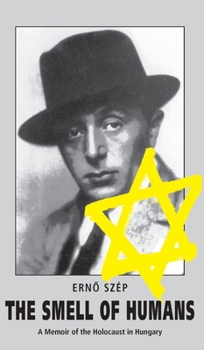The Smell of Humans: A Memoir of the Holocaust in Hungary
Select Format
Select Condition 
Book Overview
Primarily a piece of creative writing and autobiographical literature of a very distinctive Central European kind, this detailed and imaginative short memoir is also an important document of the Holocaust in Hungary in 1944. Written by a master of twentieth-century Hungarian literature, it describes life for the Jewish population of German-occupied Budapest--the constant fear of deportation overshadowing the daily trials of living in the ghetto--before...
Format:Paperback
Language:English
ISBN:1858660114
ISBN13:9781858660110
Release Date:January 1994
Publisher:Central European University Press
Length:196 Pages
Weight:0.65 lbs.
Dimensions:0.6" x 5.4" x 8.4"
Age Range:18 years and up
Customer Reviews
1 rating
A pleasure to read, despite the title
Published by Thriftbooks.com User , 21 years ago
When you see the title and subtitle, you might expect an unrelentingly grim report--so unfortunately familiar from the genre of accounts by Holocaust survivors. Instead, after reading Erno Szep's story a few weeks spent digging trenches in a slave labor camp, you close the book not weary of a cheerless tale, but wishing you could have found out more--especially after Szep returned to Budapest just in time for the Soviet siege and the Nazi/Arrow Cross defense. In a series of very brief episodes, he relates with all the detail he can bear his view of the Jews in Budapest as most of its "able" men first were rounded up, then sent off to work under the sneers and beatings of the Arrow Cross. He conveys vividly the feel of forced labor and little food, the monotony, the damp, and the hunger increasing as their supplies and energy dwindle and the toil takes its toll. Unlike some other Hungarian translations of texts, this one by John Batki, a scholar who left Hungary as a teenager, manages to render into very colloquial but never casual English what must be marvelous Magyar prose. Szep's style evidently is cosmopolitan, with a snap and joie de vivre that persists despite his subject matter. Imagine a less taciturn, more convivial counterpart to Primo Levi. My only withholding of a fifth star in the rating: a stereotypically verbose and clumsily experimental preface by Dezso Tandori that reminds me of the worst of translated Hungarian stylists too enamoured of their own cleverness to remember their reader's attention span. Stick with Szep's own "autobiographical statement" and Batki's remarks. How I wish Szep had written much more! (1884-1953)Parts of his story shed new light on old events: the process by which were extended, denied, and re-extended passes by the Swedish (although Raoul Wallenberg's not mentioned by name--perhaps postwar Hungarian censorship may have been a factor?) and Spanish embassies; the fate of those who had grown up entirely Christian by birth and belief but had Jewish grandparents; the more recent converts hoping the excape the yellow star; and the printers. In this last vignette, Szep wonders why that largely socialist union, in WWI, allowed its members to produce so much propaganda for the capitalists. If they had simply refused to print the disortions of the ruling class, Szep muses, perhaps war would have been averted. Hmmm.






